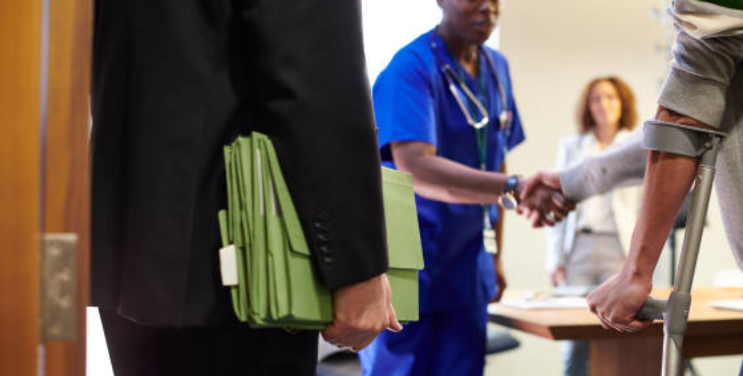From Crash to Compensation: How a Houston Motorcycle Accident Lawyer Builds Your Case

Motorcycle crashes leave victims facing physical injuries, mounting medical bills, and an overwhelming legal process. The journey from accident scene to eventual fair compensation requires skilled legal guidance. Understanding how an experienced attorney builds your case can make the difference between inadequate settlements and full recovery of damages.
After a motorcycle accident Houston riders often discover that insurance companies treat them differently than car accident victims. Bias against motorcyclists runs deep in claims processing. Adjusters frequently assume riders share fault or exaggerate injuries. This prejudice means you need an attorney who knows how to counter these unfair tactics and present your case effectively.
Understanding the Initial Consultation Process
What Happens During Your First Meeting: The initial consultation sets the foundation for your entire case. An attorney reviews accident details, examines available documentation, and evaluates the strength of your claim. This meeting typically lasts 60 to 90 minutes and covers everything from crash circumstances to your current medical condition.
Why Detailed Information Matters: Attorneys need comprehensive information to assess case value accurately. Bring police reports, medical records, insurance correspondence, and photographs if available. The more details you provide about the accident, witnesses, and your injuries, the better your lawyer can strategize. Small details that seem insignificant might prove critical later.
Assessment of Legal Options: During consultation, an attorney explains your legal rights and potential paths forward. You’ll learn about Texas personal injury laws, statute of limitations deadlines, and realistic compensation ranges. Perhaps most important, you’ll understand whether your case warrants litigation or if settlement negotiations make more sense for your situation.
See also: digital transformation in business
Building a Strong Evidence Foundation
Accident Scene Reconstruction: Professional accident reconstruction specialists analyze crash dynamics to determine exactly what happened. These experts examine skid marks, vehicle damage patterns, road conditions, and final resting positions. Their detailed reports often prove essential in establishing liability, especially when the other driver disputes fault or claims you were speeding.
Medical Documentation Collection: Complete medical records form the backbone of injury claims. Attorneys gather emergency room reports, diagnostic imaging results, treatment notes, prescription records, and prognosis statements. This documentation proves injury severity and links your medical condition directly to the crash. Missing medical evidence can devastate claim value.
Witness Statement Gathering: Eyewitness accounts provide independent verification of accident circumstances. Attorneys track down people who saw the crash and obtain detailed statements. These witnesses might include other drivers, pedestrians, nearby business employees, or passengers. Their testimony can corroborate your version of events when the other party tries to shift blame.
Physical Evidence Preservation: Damaged helmets, torn riding gear, and motorcycle parts tell important stories. Attorneys ensure this physical evidence gets preserved and photographed professionally. Vehicle damage patterns can demonstrate impact force and collision angles. This tangible proof often resonates powerfully with insurance adjusters and juries alike.
Navigating Insurance Company Negotiations
Understanding Adjuster Tactics: Insurance companies employ various strategies to minimize payouts. Adjusters might request unnecessary documentation, delay responses, or make lowball initial offers. They count on injured riders accepting quick settlements before understanding full injury extent. Experienced attorneys recognize these tactics and respond strategically to protect your interests.
Calculating True Case Value: Proper case valuation goes beyond adding medical bills and lost wages. Attorneys consider future medical needs, permanent disability, reduced earning capacity, and pain and suffering. Motorcycle injuries often involve complex orthopedic damage, traumatic brain injuries, or spinal cord trauma. These conditions require long-term care that must be factored into settlement demands.
Presenting Compelling Demand Packages: A well-crafted demand package presents your case persuasively to insurance companies. It includes medical records, economic loss documentation, expert opinions, and legal arguments establishing liability. The package demonstrates why your claim deserves full compensation. Strong presentation often leads to better settlement offers without requiring litigation.
Knowing When to Reject Settlements: Not all settlement offers deserve acceptance. Attorneys evaluate whether proposals adequately cover past and future damages. Accepting an insufficient settlement means waiving your right to additional compensation later. If negotiations stall or offers remain unreasonable, filing a lawsuit becomes necessary to pursue fair recovery.
Preparing for Potential Litigation
Filing Court Documents: When settlement negotiations fail, attorneys file personal injury lawsuits within Texas’s two-year statute of limitations. The petition outlines your claims, identifies responsible parties, and specifies damages sought. Proper pleading format and legal arguments set the stage for successful litigation. Missing filing deadlines can destroy otherwise valid claims permanently.
Discovery Process Management: Discovery allows both sides to gather evidence through depositions, interrogatories, and document requests. Attorneys prepare you for deposition testimony and handle all legal correspondence. This phase often reveals information that strengthens your position or exposes weaknesses in the defense case. Thorough discovery work frequently leads to better settlement offers.
Expert Witness Coordination: Complex motorcycle cases often require multiple expert witnesses. Medical experts explain injuries and prognosis. Accident reconstruction specialists demonstrate crash dynamics. Economic experts calculate lifetime financial losses. Vocational rehabilitation professionals assess work capacity limitations. Coordinating these experts requires extensive legal experience and strategic planning.
Trial Preparation Strategy: If your case proceeds to trial, meticulous preparation becomes essential. Attorneys develop themes, prepare exhibits, rehearse testimony, and anticipate defense arguments. Trial work demands specialized skills that not all personal injury lawyers possess. Choosing an attorney with proven courtroom experience can significantly impact your case outcome.
Maximizing Your Compensation Recovery
Economic Damages Documentation: Economic losses include quantifiable expenses like medical bills, rehabilitation costs, property damage, and lost income. Attorneys compile comprehensive documentation proving every dollar lost. This might involve employment records, tax returns, medical billing statements, and repair estimates. Detailed economic proof eliminates insurance company disputes about actual costs incurred.
Non-Economic Damages Arguments: Pain, suffering, emotional distress, and loss of life enjoyment deserve compensation too. These subjective damages lack specific dollar values but significantly impact motorcycle accident victims. Attorneys present evidence showing how injuries affected your daily activities, relationships, and mental health. Strong non-economic damage arguments can substantially increase total compensation recovered.
Future Damages Projection: Many motorcycle injuries cause permanent limitations requiring ongoing care. Attorneys work with medical experts to project future treatment needs and associated costs. Life care plans detail expected surgeries, therapies, medications, and assistive devices over your lifetime. Including these future damages in settlement demands or trial presentations ensures complete compensation for long-term consequences.
Common Challenges in Motorcycle Accident Cases
Motorcycle accident claims face unique obstacles that car accident cases rarely encounter. Bias against riders remains a significant hurdle. Insurance companies and juries sometimes assume motorcyclists take unnecessary risks or ride recklessly. Overcoming these prejudices requires presenting evidence that demonstrates your responsible riding behavior and the other driver’s clear negligence.
Another challenge involves proving injury severity when victims initially decline ambulance transport. Adrenaline can mask pain, causing riders to feel fine immediately after crashes. When symptoms emerge hours or days later, insurance companies question whether injuries actually resulted from the accident. Documentation showing prompt medical attention helps counter these arguments and establish clear causation.
Conclusion
Motorcycle accident cases demand specialized legal knowledge and aggressive advocacy. From initial consultation through settlement or trial, experienced attorneys guide victims through complex legal processes while fighting for maximum compensation. The right legal representation makes a profound difference in both recovery amounts and overall case outcomes. If you’ve been injured in a motorcycle crash, don’t navigate this challenging journey alone. Contact a qualified personal injury attorney today to discuss your case and learn about your legal options for pursuing the compensation you deserve.




